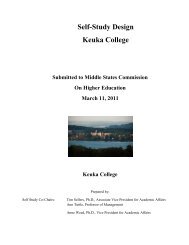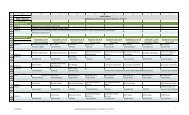final version of the self-study document - Keuka College's Middle ...
final version of the self-study document - Keuka College's Middle ...
final version of the self-study document - Keuka College's Middle ...
You also want an ePaper? Increase the reach of your titles
YUMPU automatically turns print PDFs into web optimized ePapers that Google loves.
Fall 2010 259 156 83 or 53% 40 or 48%<br />
Spring 2011 333 200 91 or 45% 60 or 65%<br />
Fall 2011 494 268 122 or 45% 74 or 60%<br />
Spring 2012 388 233 97 or 42% 60 or 61%<br />
Within <strong>the</strong> ASAP model, in addition to academic warnings, a system <strong>of</strong> tracking student<br />
withdrawals serves to immediately notify academic and non-academic staff <strong>of</strong> student issues.<br />
The advising and academic staff members use a variety <strong>of</strong> tools to communicate with each o<strong>the</strong>r<br />
regarding students at risk. ASAP student advisors speak with each student wishing to withdraw<br />
from a course or <strong>the</strong> College. This conversation allows for team members to assist <strong>the</strong> students<br />
in making <strong>the</strong> best informed decision and help guide <strong>the</strong> students through <strong>the</strong> withdrawal<br />
process. When possible, <strong>the</strong> student advisors encourage students to remain in <strong>the</strong> program and<br />
<strong>of</strong>fer alternative options or support services to help <strong>the</strong> student succeed. If withdrawal is<br />
required, <strong>the</strong> student advisors work with students individually to re-enroll <strong>the</strong>m in a course <strong>of</strong><br />
<strong>study</strong> when <strong>the</strong> time is right for <strong>the</strong>m to return. The ASAP Director <strong>of</strong> Program Administration<br />
and Student Services (DPASS) serves to collect data and coordinate efforts at ASAP for student<br />
retention. The ASAP retention team, led by <strong>the</strong> DPASS, meets monthly and is comprised <strong>of</strong><br />
staff members, administration and faculty from ASAP.<br />
<strong>Keuka</strong> China/Vietnam Program Student Services - Academic support services in <strong>the</strong>se<br />
International programs are provided at <strong>the</strong> partner universities. In addition to <strong>the</strong> faculty<br />
instructor, each class has a “class teacher” who oversees <strong>the</strong> cohort, and a student “class<br />
monitor” who monitors attendance, arranges for copies <strong>of</strong> Power Point slides or handouts, and<br />
o<strong>the</strong>r administrative details. The on-site Program Coordinators work closely with students to<br />
apprise <strong>the</strong>m <strong>of</strong> <strong>the</strong>ir progress and to provide <strong>the</strong>m resources as necessary. In <strong>the</strong> past, <strong>the</strong> partner<br />
schools have provided tutors, teaching assistants, and interpreting services to support student<br />
success. <strong>Keuka</strong> College faculty teaching in <strong>the</strong> Vietnam program regularly schedule additional<br />
class sessions, <strong>study</strong> groups and <strong>of</strong>fice hours to provide support to students. In 2011-12, <strong>the</strong><br />
<strong>Keuka</strong> China and <strong>Keuka</strong> Vietnam Programs requested that all faculty issue academic warnings to<br />
students during <strong>the</strong> course. The partner universities responded well, meeting with students to<br />
plan ways to improve student success, through extra English <strong>study</strong>, tutors or <strong>study</strong> groups, and<br />
meetings with instructors.<br />
The effectiveness <strong>of</strong> <strong>the</strong>se services is assessed through ongoing monitoring <strong>of</strong> academic concerns<br />
and course requirements by <strong>the</strong> <strong>Keuka</strong> College Program Directors who are in regular<br />
communication with <strong>the</strong> deans and staffs at partner universities. This assessment led to <strong>the</strong><br />
introduction <strong>of</strong> academic warnings, as noted above. An assessment <strong>of</strong> English language<br />
pr<strong>of</strong>iciency <strong>of</strong> <strong>Keuka</strong>-China students at Wenzhou University indicated that students did not have<br />
sufficient command <strong>of</strong> <strong>the</strong> English language and could not complete <strong>the</strong> course requirements,<br />
which led <strong>Keuka</strong> to discontinue freshmen enrollment intake for <strong>the</strong> 2008-09 academic year.<br />
Wenzhou University <strong>the</strong>n implemented additional English instruction and <strong>the</strong> program was<br />
resumed in 2009-10. However, English language pr<strong>of</strong>iciency remains problematic at Wenzhou,<br />
and accordingly, no new Wenzhou students will be admitted to <strong>the</strong> <strong>Keuka</strong> China program<br />
beginning in Fall 2012.<br />
On Campus International Student Services – The ASK <strong>of</strong>fice provides academic support for<br />
international students, but additional support comes from <strong>the</strong> Center for Global Education <strong>of</strong>fice.<br />
Page 21 <strong>of</strong> 39 Chapter 5: Admissions, Retention & Support




